I was simply flabbergasted that I reached nearly the age of 40 before I learned that dairy cows don’t just always produce milk. I was really ashamed of my ignorance for a long while until I started speaking with other grown people who had no idea either. Then it dawned on me that we are trained to not know. The dairy industry would prefer that we not know. Why?
Because the dairy industry is an immensely cruel industry.
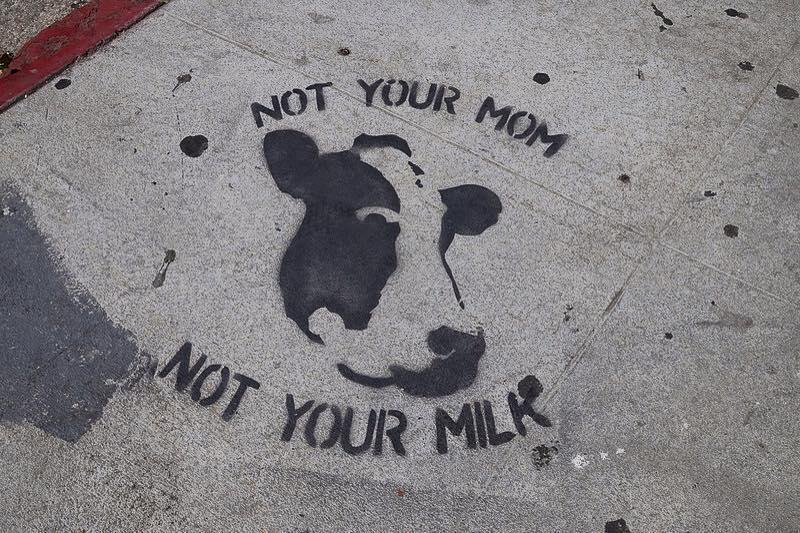
To make animal milk available to humans for consumption requires cruelty because it goes against humane instincts and natural laws.
1. Humans are the only species who consume milk after infancy. Milk is for babies.
2. Humans are the only species who consume milk from another species. Any mother’s milk is for her baby.
When I say milk I mean the liquid white stuff as well as cream, butter, cheese, sour cream, kefir, whey, cream cheese, buttermilk, yogurt, ice cream, and anything else made from animal milk.
What’s so cruel about milking a cow?
I write here about cows being milked because cow milk is the dominant animal milk consumed by humans, but other lactating animals like goats and sheep are treated the same ways.
In 2011 it was estimated that 85% of all milk consumed worldwide was produced from cows. (source) According to 2007 data provided by the USDA, factory farms produced more than 80% of milk sold in the US. Organic milk sales accounted for 4%. (source)
In order for any mammal, including cows, to be milked, the female must first produce milk. The only time a female mammal (think of a female human) produces milk is after she has birthed a baby. Milk exists for babies. Her babies.
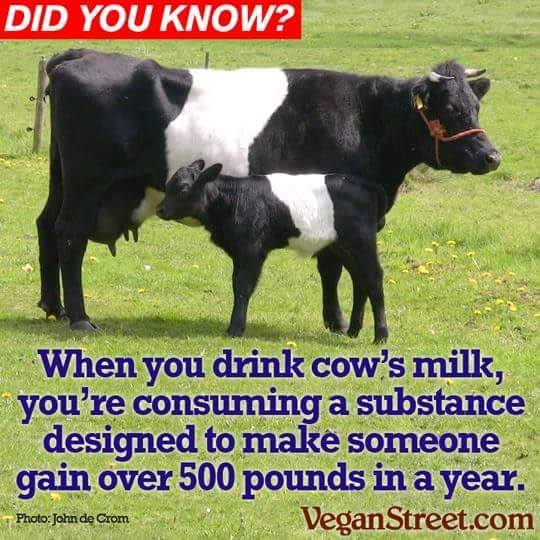
In dairies, after the mother has birthed her baby, the baby is removed and the mother is hooked up to an automated milking machine.
Her baby gets very little of the milk created for him/her. The mother-baby bond is broken and not allowed to develop.

The parts of the brain that humans share with cows are the reptilian and mammalian brain. The mammalian brain is the seat of emotion and memory. Imagine having your baby taken from you after birth, up to 10 times in your lifetime. A cow experiences the same emotions you would: anger, fear, sadness, and grief.
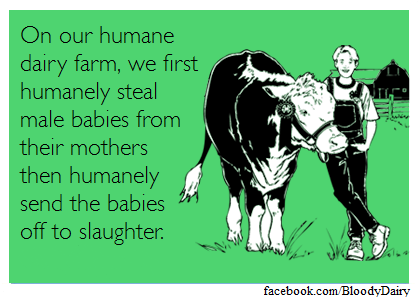
Let’s back up and talk about how those babies are produced. A handsome bull doesn’t roll around and seduce the blushing cow. Rather his sperm is artificially captured in containers and she is artificially impregnated with a sperm gun on a rape rack (industry terms).
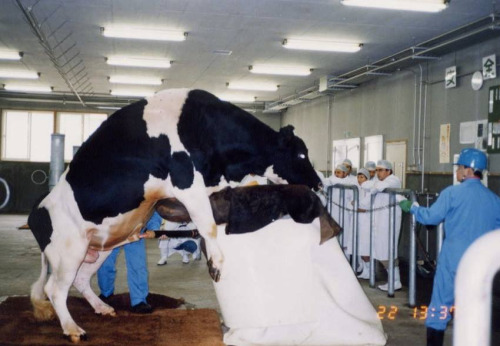
Dairy farmers usually begin breeding or artificially inseminating heifers around 13 months of age. A cow’s gestation period is approximately 9 months. Newborn calves are removed from their mothers quickly, usually within one day (sometimes within hours) and no more than three, as the mother/calf bond intensifies over time and delayed separation can cause extreme stress on the calf. (source) After separation, young dairy calves subsist on commercial milk replacer.
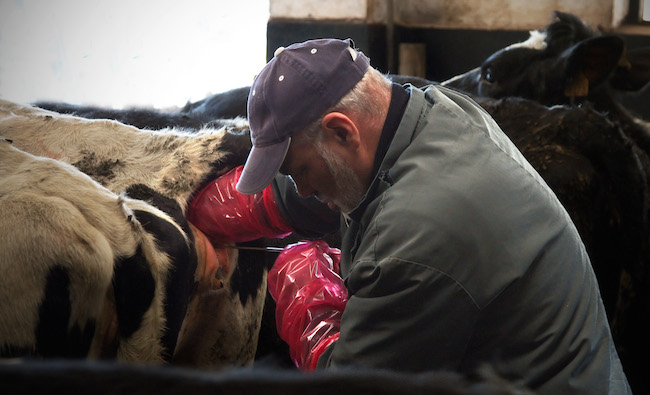
The natural life span of a cow is 20 years. After serial impregnation and constant milk production, she exhausts and lives about 4 to 5 years and then sent to slaughter for cheap meat.

If her calf is male, he will either be destroyed, sent to the veal industry, or raised for beef. If intended for veal, he will live in a small pen, discouraged from developing muscle, and kept anemic to produce white, tender meat.
If her calf is female, she will suffer the same fate as her mother.
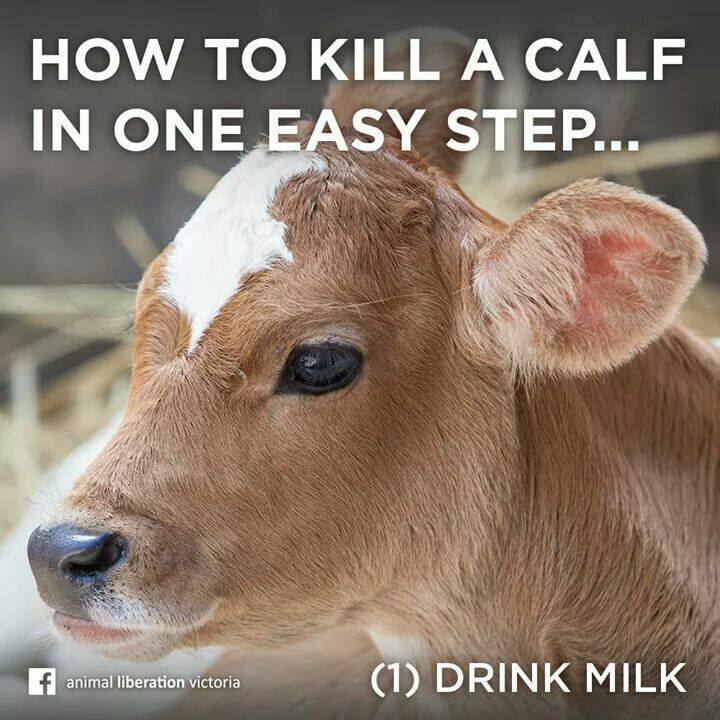
The dairy industry is a place where the most fundamental of relationships – that between mother and child – is disregarded and forcibly broken. The lactating females are abused, exhausted, then killed. Her children are tortured then killed. All for a product that humans do not need to consume for survival and, in fact, is detrimental to optimal health.
Doesn’t milk do a body good?
Yes, if you are a baby and you are drinking your mother’s milk. Otherwise, no.
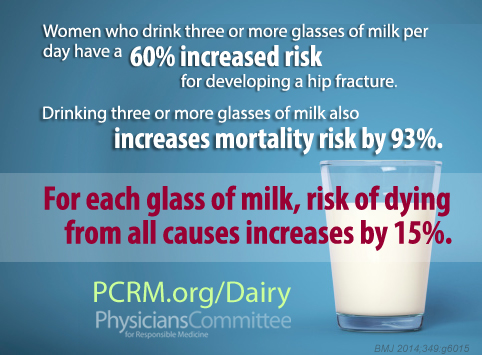
Animal milk:
• is high in cholesterol and saturated fat which contribute to heart disease
• is acid-producing in the body leading to inflammation
• leeches calcium from the bones contributing to osteoporosis
• contains natural female pregnancy and growth hormones of a 700 pound pregnant bovine preparing to birth a 65 pound calf & artificial hormones to increase milk production
• contains casein, a milk protein, that is a known carcinogen
• is constipating
• is associated with many medical conditions from asthma to acne
• contains antibiotics (unless produced by organic standards)
• may contain pus (white blood cells) as a by-product of infected udders (mastitis)
Luckily there are many plant-based vegan dairy alternatives for those who wish to continue enjoying these foods items and want to improve or preserve their health, offer compassion toward animals, and reduce the damage being done to the environment by milk production.
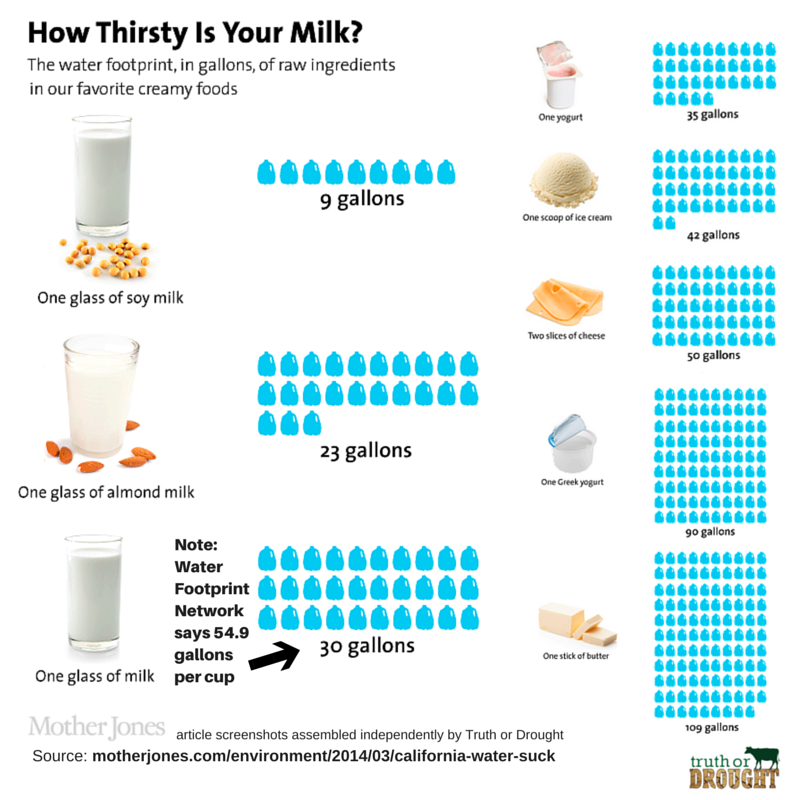
I’m personally not a fan of packaged or processed foods, but if you cruise the aisles at the grocery store you will find soy, rice, almond, coconut, and other milk options. There are non-dairy plant-based vegan cheeses, margarines, cream cheeses, sour creams, and ice creams.
My favorite plant-based milk is homemade almond milk. It is delicious and easy to make.
Click: My Favourite Homemade Almond Milk + Step By Step Photos
This vegan sour cream is amazing!
Click: Homemade Vegan Sour Cream
And here’s a great resource for homemade vegan cheeses.
Click: 14 Vegan Cheeses That Will Make You Forget About The Real Thing
The milk industry has convinced you that you need milk and other dairy products in order to source calcium for your body. But where do you think cows got their calcium so that they could store it in their body and pass it to you through their milk? They got it from plants, and so can you.
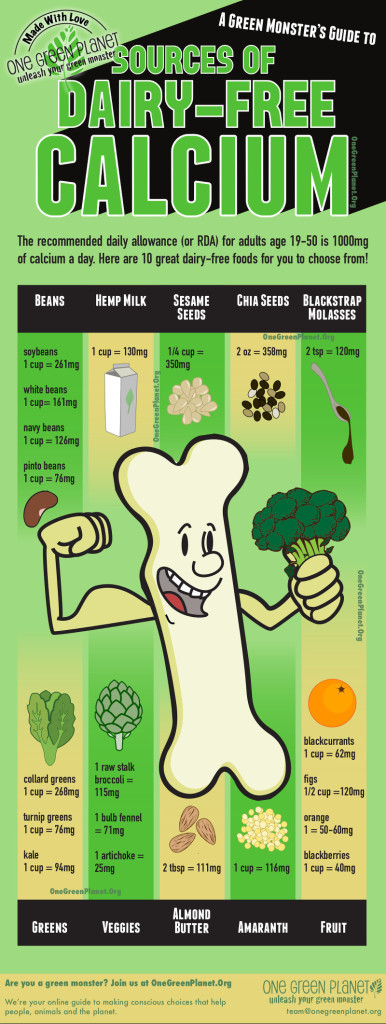
Leafy greens are full of calcium and so are many other whole plant foods that are more alkalizing than animal milk, contain no saturated fat or cholesterol, and do not leech calcium from your bones. These are not only safer foods choices than animal dairy, but better calcium sources.
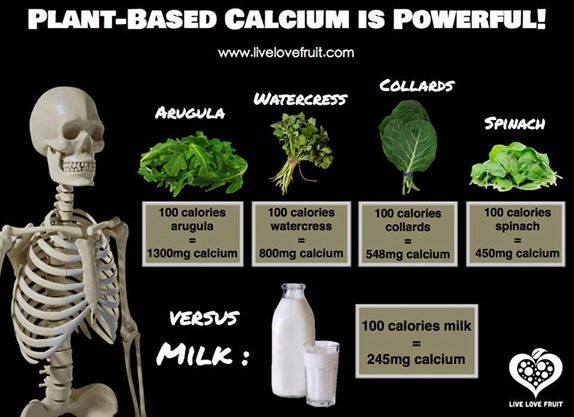
There is absolutely no need for animal milk or dairy products in the adult human diet. Consuming such is putting your health at risk, torturing animals, and wrecking havoc on our planet. Human babies need only their own mother’s milk.
Vegans don’t stop drinking milk and eating cheese or other dairy products because they don’t like the taste. Instead they have woken up to the cruelty embedded in the dairy industry and have chosen not to participate. You can still enjoy the flavors with plant-based vegan dairy alternatives and feel good about your choices!
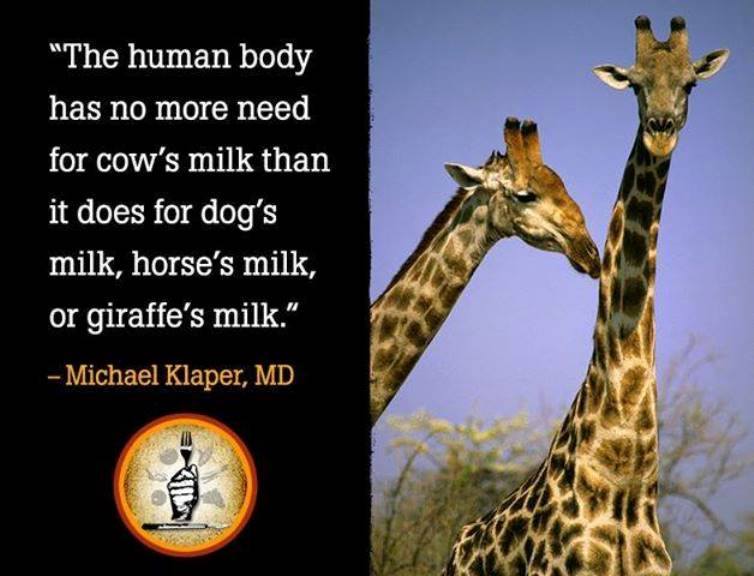
If you want or need help adopting a safe & smart vegan plant based diet, check out The Vegan Key™ which is my unique e-book and professional coaching program.
Additional Resources
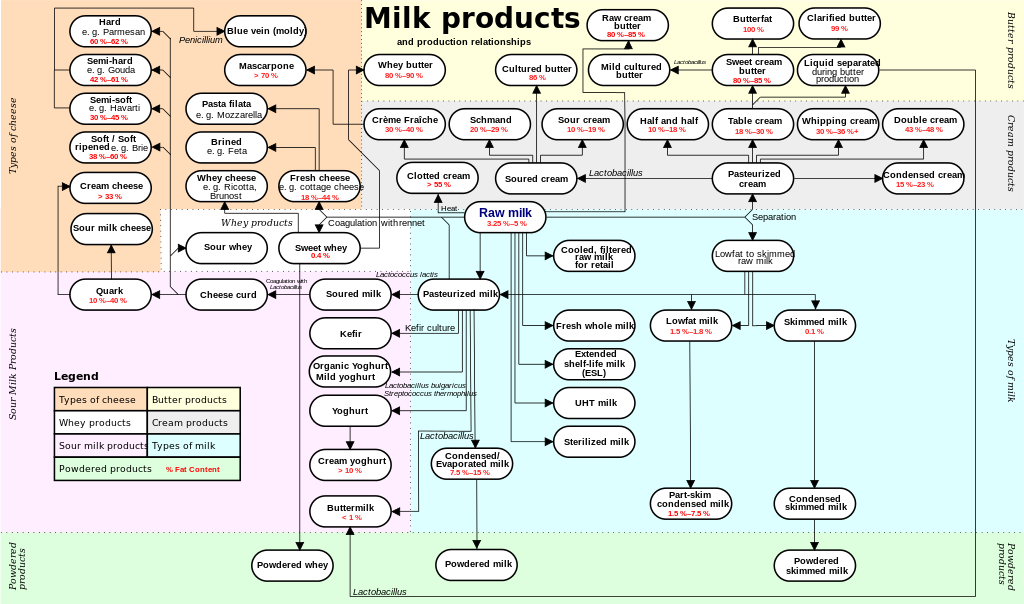

{ 10 comments… read them below or add one }
GREAT article, Carla! Thanks for all your hard work!!!
Thank you Helyn for your kind words, for reading, and taking the time to comment!!
Thank u Carla I was not aware of the wicked acts of the milk industry.
I’m glad you took the time to learn and open your eyes to the atrocities of the dairy industry. Thank you Sharon!
thanks so much! What fantastic information and graphics. Although it made me cry and feel terribly angry, I was happy for the education.
Thank you Claudia for reading despite your sadness and anger. It’s not always pleasant waking up to the truth of the horrors we inflict on innocent animals. I appreciate you taking the time to read & comment!
Thank you Carla for one of the best articles I’ve seen on dairy and it’s hidden life. This will surely help others to understand the vileness of commercial agriculture. Every product we buy has an effect and if we can get people to understand that, we can make changes for the better. Thank you for all the hard work you do to make this a better world for all beings. All beings deserve to live their life as they were born to do, naturally and without the interjection of humans thinking they are God.
Thank you Kathie! I’m so honored to be on this mission with you!
Good article, Carla, nice and true words, Kathie.
GREAT article, Carla! I am a fan of your writing. Thanks for all your hard work!!!